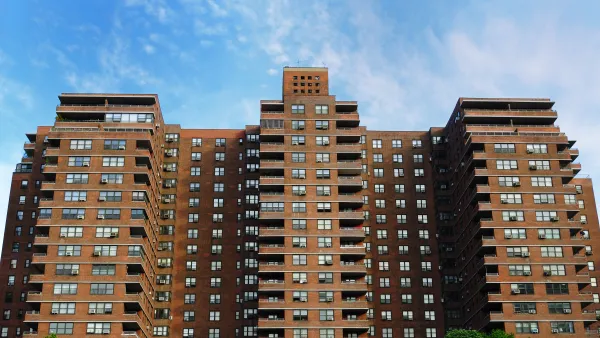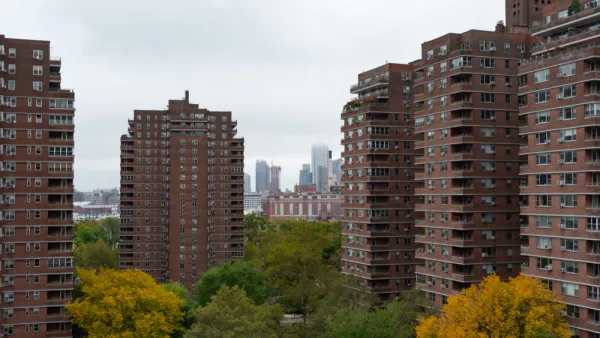Conventional planning think says that mixed-income development benefits low-income neighborhoods. But a survey finds that residents of public housing in New York don't agree—rather, they feel left behind by newcomers to the neighborhood.
Greg B. Smith reports on a study by Abt Associates and New York University's Furman Center for Real Estate, commissioned by the city of New York, about the impacts of gentrification on residents of New York City Housing Authority buildings. According to Smith, the report "reached a conclusion most New Yorkers already accept as true: gentrification doesn't help the poor."
"The study, 'The Effects of Neighborhood Change on NYCHA Residents' [pdf]…found that NYCHA tenants often wind up feeling like aliens in their own neighborhoods, surrounded by newcomers who claimed they'd just 'discovered' the neighborhood."
The study, released in May, runs counter to the narrative about the benefits of developing new mixed-income housing in low-income neighborhoods. During the same month, the de Blasio Administration announced "a controversial plan to build hundreds of market-rate apartments on 'underutilized' NYCHA property," according to Smith.
NYCHA spokesperson Aja Worthy-Davis noticed the difference, releasing this statement about the goals of the proposal to build more units on NYCHA properties: "By building both affordable and mixed-income housing, we will protect NYCHA housing, expand affordable housing options for everyday New Yorkers, and bring small businesses and services like supermarkets and restaurants closer to NYCHA developments….We will in turn use this growth to connect NYCHA residents to new employment opportunities."
The article includes a lot more detail about the study and its implications for New York and on the debate about investment in low-income neighborhoods.
FULL STORY: EXCLUSIVE: NYCHA residents see little benefit from gentrification in their neighborhoods, report shows

Analysis: Cybertruck Fatality Rate Far Exceeds That of Ford Pinto
The Tesla Cybertruck was recalled seven times last year.

National Parks Layoffs Will Cause Communities to Lose Billions
Thousands of essential park workers were laid off this week, just before the busy spring break season.

Retro-silient?: America’s First “Eco-burb,” The Woodlands Turns 50
A master-planned community north of Houston offers lessons on green infrastructure and resilient design, but falls short of its founder’s lofty affordability and walkability goals.

Test News Post 1
This is a summary

Analysis: Cybertruck Fatality Rate Far Exceeds That of Ford Pinto
The Tesla Cybertruck was recalled seven times last year.

Test News Headline 46
Test for the image on the front page.
Urban Design for Planners 1: Software Tools
This six-course series explores essential urban design concepts using open source software and equips planners with the tools they need to participate fully in the urban design process.
Planning for Universal Design
Learn the tools for implementing Universal Design in planning regulations.
EMC Planning Group, Inc.
Planetizen
Planetizen
Mpact (formerly Rail~Volution)
Great Falls Development Authority, Inc.
HUDs Office of Policy Development and Research
NYU Wagner Graduate School of Public Service



























